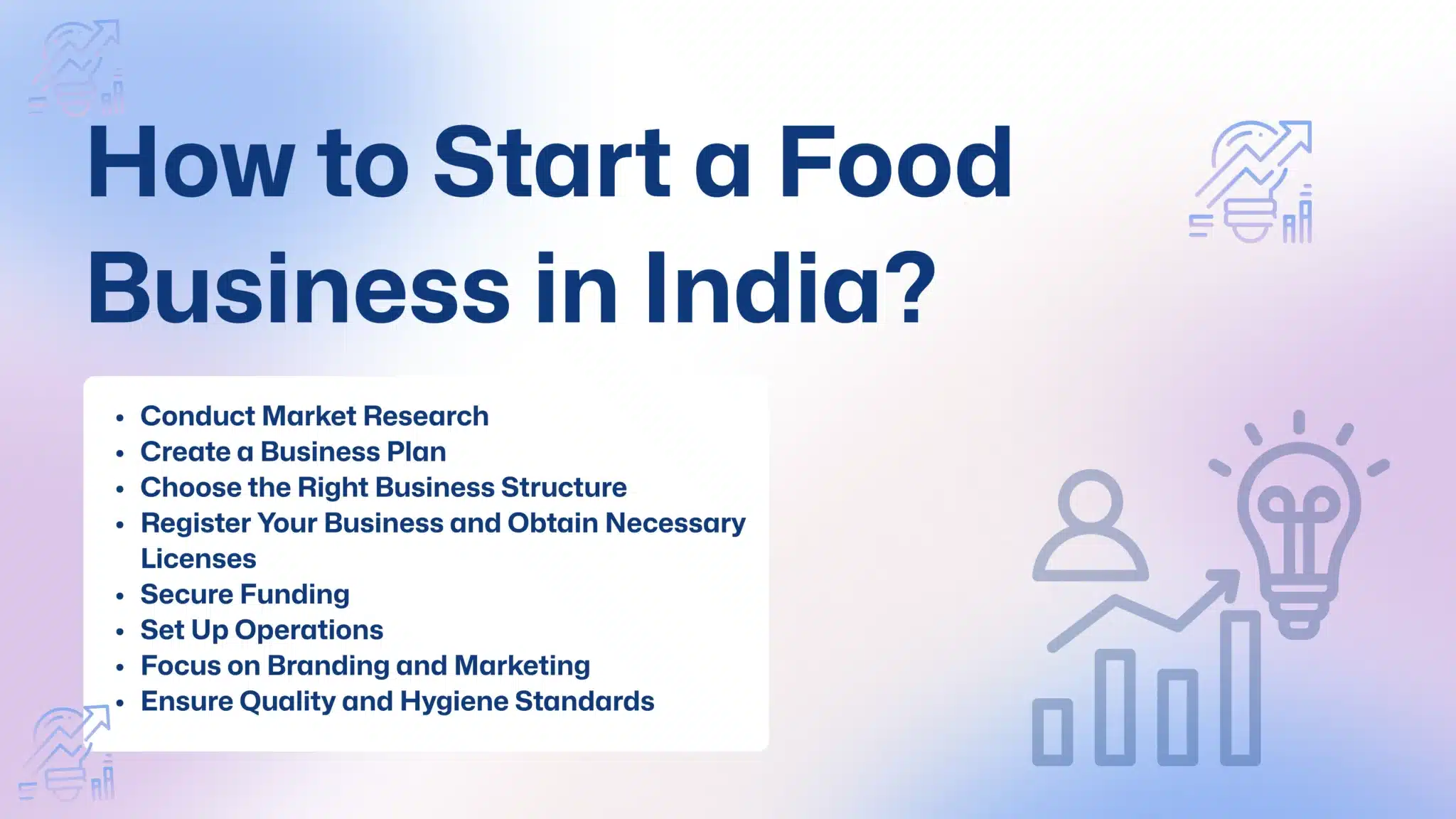IndiaтАЩs food industry is growing fast. PeopleтАЩs eating habits are changing as cities grow and life gets busier. More people now want quick and easy meal options. This has made food delivery apps, cloud kitchens, and organic food brands very popular.
As incomes rise and more people enjoy eating out or ordering in, 2025 looks full of new chances for food startups. ItтАЩs the right time for fresh and creative food business ideas that match what todayтАЩs consumers are looking for. With social media trends and digital platforms shaping choices, even small businesses can reach large audiences and build strong brands. The food sector is becoming one of the most promising spaces for new entrepreneurs in India.
In this blog, we will explore:
- Profitable food business ideas for 2025
- Key Legal & Compliance Requirements
- The steps to start a successful food business in India
- Challenges in the Food Business and how to overcome Them
- Future of Food Businesses in India
- Conclusion
Best Food Business Ideas for 2025
Cloud Kitchens and Virtual Restaurants
Cloud kitchens operate without a dine-in space, focusing entirely on food delivery. This model reduces operational costs and enables multiple brands to function from a single kitchen.
- Market Potential: Expected to reach $1.05 billion by 2025 (Source).
- Challenges: High competition, brand visibility, and reliance on food aggregators.
Organic and Health-Conscious Foods
Consumers are becoming more health-focused, leading to a rise in demand for organic and gluten-free products. Businesses selling organic vegetables, superfoods, and plant-based alternatives are thriving.
- Growth Rate: The organic food market in India is projected to grow at a CAGR of 20% from 2022-2025 (Source).
- Challenges: High procurement costs and certification processes.
Food Trucks and Mobile Eateries
Food trucks are an affordable way to serve tasty street food. They can easily move to busy areas, helping you reach more customers and grow your business.
- Profitability: Monthly revenues can range from INR 1-3 lakh, depending on location and menu (Source).
- Challenges: Licensing restrictions and parking issues.
Plant-Based and Vegan Foods
With growing awareness of sustainability and dietary choices, plant-based foods are becoming mainstream.
- Market Insight: India ranks as the third-largest vegan market globally.
- Challenges: Consumer awareness and sourcing high-quality ingredients at reasonable prices.
Meal Prep and Subscription-Based Food Services
Busy professionals prefer pre-portioned, healthy meal kits delivered to their doorsteps.
- Revenue Potential: Well-managed meal services can generate INR 5-10 lakh monthly revenue (Source).
- Challenges: Managing logistics, delivery efficiency, and food preservation.
Themed Caf├йs and Unique Dining Experiences
Themed restaurants are getting popular. From pet caf├йs to gaming and book caf├йs, they attract people who want a fun and different dining experience.
- Trend Analysis: Restaurants with innovative concepts see 30% higher footfall than regular establishments.
- Challenges: High initial investment and dependency on foot traffic.
Key Legal & Compliance Requirements
Before starting your food business, you must follow a few legal rules:
- FSSAI License: Needed for selling or making food in India.
- Trade License & Shop Act: Lets you run your shop or caf├й legally.
- GST Registration: Needed to collect and pay taxes.
- Fire & Pollution NOC: Keeps your business safe and eco-friendly.
- Trademark Registration: Protects your food brand name and logo.
If you are running your business as a sole proprietorship or partnership, you still need to follow these compliance rules. Proper registration ensures your sole proprietorship or partnership business operates smoothly and gains customer trust. Following these rules helps your business stay safe, trusted, and ready to grow.
How to Start a Food Business in India?
Starting a food business requires proper planning, legal compliance, and financial investments. HereтАЩs a step-by-step guide:

Step 1: Conduct Market Research
- Identify your target audience.
- Analyze competitors and current food trends.
- Evaluate demand and potential profitability.
Step 2: Create a Business Plan
- Define your business model (restaurant, cloud kitchen, food truck, etc.).
- Set pricing strategies and financial projections.
- Develop branding and marketing approaches.
Step 3: Choose the Right Business Structure
- Sole Proprietorship: Best for small businesses.
- Partnership: Suitable for joint ventures.
- LLP (Limited Liability Partnership): Reduces financial risks.
- Private Limited Company: Ideal for scalability and investments.
Step 4: Register Your Business and Obtain Necessary Licenses
- FSSAI License (Food Safety and Standards Authority of India) тАУ Mandatory for all food businesses.
- GST Registration тАУ Required for tax compliance.
- Trade License тАУ Issued by the municipal corporation.
- Health and Safety Permits тАУ Ensures regulatory compliance.
- Fire and Safety Certificate тАУ Essential for dine-in restaurants.
Step 5: Secure Funding
- Personal savings or bootstrapping.
- Bank loans and financial institutions.
- Angel investors and venture capitalists.
- Crowdfunding platforms (such as Ketto and Milaap).
Step 6: Set Up Operations
- Choose a strategic location.
- Invest in kitchen equipment and hire skilled staff.
- Build relationships with suppliers for raw materials.
Step 7: Focus on Branding and Marketing
- Create a website and engage in digital marketing.
- Partner with food delivery apps like Swiggy and Zomato.
- Leverage influencer marketing and social media.
- Offer discounts and loyalty programs to retain customers.
Step 8: Ensure Quality and Hygiene Standards
- Conduct regular quality checks.
- Maintain hygiene protocols as per FSSAI regulations.
- Implement customer feedback to improve services.
Challenges in the Food Business and how to overcome them
- High Competition: Businesses need strong branding and differentiation.
- Regulatory Compliance: Acquiring licenses and maintaining compliance can be complex.
- Operational Costs: Managing rent, salaries, and inventory efficiently.
- Customer Retention: Engaging customers through loyalty programs and excellent service.
How to Overcome These Challenges
Stand Out from the Competition:
Create a strong brand with your own style and story. Use social media to show what makes your food special and talk with your customers often.
Handle Compliance Smartly:
Keep track of all FSSAI and GST rules. You can also get help from experts like FinGuru India to manage licenses and paperwork easily.
Control Operational Costs:
Watch your spending closely. Use tools to manage orders, stock, and staff. Start small and grow slowly instead of spending too much at once.
Keep Customers Coming Back:
Give rewards or discounts to regular customers. Offer great service and listen to their feedback. Happy customers are more likely to return and recommend your business.
With smart planning and good support, both Sole Proprietorship and Partnership food businesses can turn challenges into success stories.
Future of Food Businesses in India
The future of IndiaтАЩs food industry looks bright. New tools like AI and automation are making cooking and delivery faster and smarter. More people now prefer plant-based and eco-friendly food, opening doors for healthy and green food brands.
Indian food businesses, whether Sole Proprietorships or Partnerships, also have a chance to go global, as people worldwide love Indian flavours. With the right mix of technology, quality, and creativity, the future of food in India is full of exciting possibilities.
Conclusion
IndiaтАЩs food industry is growing fast, with many chances in areas like cloud kitchens and organic food. New business owners can grow by choosing the right idea, following rules, and using simple marketing. Good food, friendly service, and an active online page can help your business succeed.
People now want fresh and healthy food, so small food startups, whether run as a Sole Proprietorship or a Partnership, can do really well. With the right plan and support, your food business can grow quickly. For more help, visit Finguru India or talk to an expert to get personal guidance.
Need help? How to Start a Food Business in India.
ЁЯУЮ Book a Consultation with Our Expert!
ЁЯУЮ Call Us: +91-9999127022




